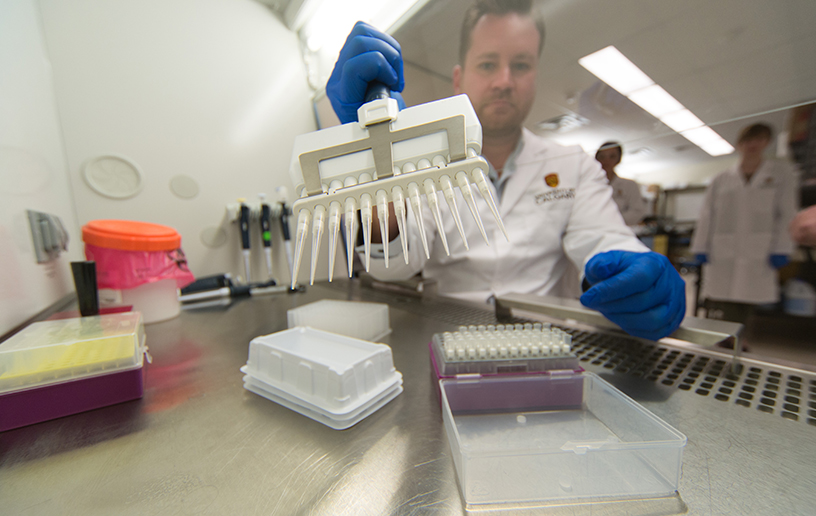New federal funding supports UCalgary’s commitment to economic diversification and innovation: Western Economic Diversification Canada provides $7.2 million for four projects
The innovation ecosystem being cultivated by the University of Calgary received a substantial boost with a significant funding announcement from the federal government for four key projects that help take cutting-edge research and turn it into commercial ventures.
Western Economic Diversification Canada announced a total of $7.2 million targeted at UCalgary initiatives designed to foster innovation and help diversify Calgary’s economy.
“This funding will provide crucial resources, and it demonstrates a firm commitment to driving innovation at the University of Calgary, as we continue advancing real-world solutions in our community and around the world,” says Dr. Ed McCauley, president of the University of Calgary. “We’re excited that Western Economic Diversification Canada sees the capacity of our researchers and values their contributions to society.”
The funding announcement includes $3.1 million for the Life Sciences Innovation Hub, $1.1 million for the W21C Digital Health Innovation Hub, $2 million for Alberta Precision Exchange (APEX), and $1 million for the Creative Destruction Lab – Rockies. Read the announcement and the backgrounder.
Kosar Lotfali Khan - Exploring the Flux Map of Death
Dr. Lewis and UCalgary President and Vice-Chancellor Ed McCauley Present the University’s Vision for Entrepreneurship and Innovation
University of Calgary to lead pan-Canadian microbiome research core
Driving discovery with world-class facilities and expertise
The microbiome has an impact on every organ in the body. It is associated with every chronic disease that affects humans. For the past few years, research has focused on cataloguing what microbes are present on and in our bodies, and connecting those microbes to specific diseases. The next step is to find out how those microbes function and interact during times of health and disease. With that knowledge, scientists hope to harness the power of the microbiome to develop preventive and therapeutic approaches to promote human health.
A number of University of Calgary researchers will be part of a Pan-Canadian "brain trust" of microbiome experts including, top row from left: Paul Kubes, Joe Harrison, Braedon McDonald, Ian Lewis, and Markus Geuking. Bottom row, from left: Kathy McCoy, Marie Claire Arrieta, Shaunna Huston, and Laura Sycuro. Photos by Don Molyneaux, for the Snyder Institute for Chronic Diseases
Dr. Lewis joins President Cannon to share a vision for the future
Dr. Lewis and Dr. Cannon presented the vision for a new Canadian Centre for Clinical Diagnostics at the Idea Exchange in San Francisco, Oct 29, 2018. Click to listen to the audio recording of the presentation.
What's in your bloodstream? Calgary researchers want to find out
You can't miss the vehicles zipping around Calgary and parts of Southern Alberta with the green Calgary Laboratory Services logo on the side. Kind of a taxi for blood samples with the passenger's trip being a time sensitive one with the possible life saving purpose of testing the blood sample for infections or pathogens.
No matter how fast the sample makes it to the lab from any of the 1 million people who end up using the service every year, testing takes time but with new research funding in hand, Ian Lewis and Deidre Church hope to change that. They received GAPP funding through Genome Alberta last year and are using it to take a prototype machine to a final version that can cut the time it takes to identify bloodstream pathogens from up to 4 days to as little as 4 hours. With new funding announced this week (January 25th) the 2 researchers are taking on the broader challenge of treating infections while not adding to the problem of antimicrobial resistance. Here's what Genome Alberta's President and CEO David Bailey had to say in his remarks at the official funding announcement at the University of Calgary.
U of C antibiotic study helps physicians battle dangerous bacteria
Researchers at the University of Calgary are helping antibiotics work smarter, not harder, by giving physicians new tools to diagnose infections.
Ian Lewis, assistant professor at the U of C and project lead of precision infection management (PIM), says not much about antibiotics has changed since Alexander Fleming discovered penicillin in 1928.
But thanks to an $11-million grant, PIM will use new diagnostic tools — including a smartphone app and a new database called ResistanceDB — to slow dangerous bacteria's antibiotic resistance by helping clinicians identify pathogens and prescribe the correct treatments.
UCalgary genomics researchers receive government support
Three projects funded by CIHR, Genome Canada and partners
The University of Calgary has received a funding boost for research projects as part of a major investment in genomics and precision health research.
Precision health promises to shape the way Canadians receive medical care. In the near future, doctors may be able to precisely diagnose symptoms based on a patient’s unique genetic makeup and offer them unique treatments that can save the patient’s life.
The funding was announced by Kent Hehr, minister of sport and persons with disabilities, on behalf of Minister of Science Kirsty Duncan, as part of a $162-million investment through Genome Canada, the Canadian Institutes of Health Research and co-funding partners, in 15 genomics and precision health projects across Canada.
Lewis Research Group Hosts Minister Kent Hehr to discuss the emerging problem of antimicrobial resistance
Calgary team leads international effort to reduce death and disability from infections
Precision Infection Management approach will save thousands of lives
The University of Calgary and Calgary Laboratory Services (CLS) are leading an $11-million program to develop a new strategy to combat infections.
Precision Infection Management (PIM) will allow doctors to rapidly identify serious infections and stop them before they develop into life-threatening conditions, says Ian Lewis, an Alberta Innovates Translational Health Chair-Metabolomics at the university’s Faculty of Science.
Eight opportunistic pathogens cause more than 85 per cent of bloodstream infections. The University of Calgary and Calgary Laboratory Services have teamed up to find a new way to rapidly identify serious infections and stop them before they develop into life-threatening conditions. Faculty of Science photo
Lewis Research Group awarded $6M to build rapid diagnostic tool for bloodstream infections
The Genomic Applications Partnership Program (GAPP) funds translational research and development projects that address real-world challenges and opportunities as identified by industry, government, not-for-profits, and other “receptors” of genomics knowledge and technology. The following five projects have been selected for funding in Round 8 of GAPP, for a total investment of $24.5 million ($8.1 million from Genome Canada and $16.4 million from co-funding partners including provincial governments, private sector and not-for-profit organizations).
Visiting artist opens conversation on art and science
The Lewis Lab has established a collaborative art project with Rick Love, Chair and Associate Professor of Art & Design, University of Northwestern, St. Paul (Minnesota). The goal of this project is to develop an expressive medium for articulating the significance of metabolomics, and the Lewis laboratory's transnational health research goals, to a wider audience via the common language of art.
Compelling Calgarians 2016 — 20 people to watch
Maybe Dr. Ian Lewis and his Calgary team aren’t going to save the world. But, then again, maybe they are.
The 37-year-old biochemist is the new Alberta Innovates Chair in Translational Heath — Metabolomics, and is leading a team tackling what he calls a global health crisis that sees one in every 25 hospitalized Canadians getting an infection (220,000 hospital infections per year, resulting in 8,000 deaths).
The Colorado-born scientist was recruited to Calgary from Princeton University to work in the field of metabolomics (the emerging science of measurement and analysis of metabolites) that will use radically different analytical tools to identify patients at risk of infection “to prevent them from dying.”













